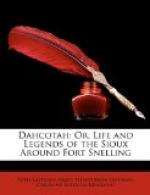“Soon her husband called to her; she did not answer him, but placed her child high up in the canoe, so that his father could see him, and getting in herself she paddled towards the rapids.
“Her husband saw that Unk-tahe would destroy her, and he called to her to come ashore. But he might have called to the roaring waters as well, and they would have heeded him as soon as she.
“Still he ran along the shore with his arms uplifted, entreating her to come ashore.
“Wenona continued her course towards the rapids—her voice was heard above the waters as she sang her death song. Soon the mother and child were seen no more—the waters covered them.
“But her spirit wanders near this place. An elk and fawn are often seen, and we know they are Wenona and her child.”
“Do you love me as Wenona loved?” continued the Sioux, as he met the looks of the young girl bent upon him.
“I will not live when I see you no more,” she replied. “As the flowers die when the winter’s cold falls upon them, so will my spirit depart when I no longer listen to your voice. But when I go to the land of spirits I shall be happy. My spirit will return to earth; but it will be always near you.”
Little didst thou dream that the fate of Wenona would be less sad than thine. She found the death she sought, in the waters whose bosom opened to receive her. But thou wilt bid adieu to earth in the midst of the battle—in the very presence of him, for whose love thou wouldst venture all. Thy spirit will flee trembling from the shrieks of the dying mother, the suffering child. Death will come to thee as a terror, not as a refuge.
CHAPTER II.
When the Chippeways broke up their camp near Fort Snelling, they divided into two parties, one party returning home by the Mississippi, the other by way of the St. Croix.
They parted on the most friendly terms with the Sioux, giving presents, and receiving them in return.
Some pillagers, who acknowledge no control, had accompanied the Chippeways. These pillagers are in fact highwaymen or privateers—having no laws, and acting from the impulses of their own fierce hearts.
After the Chippeways had left, the pillagers concealed themselves in a path near Lake Calhoun. This lake is about seven miles from Fort Snelling.
Before they had been concealed one hour, two Dahcotahs passed, father and son. The pillagers fired, and the father was killed instantly; but the son escaped, and made his way home in safety. The boy entered the village calling for his mother, to tell her the sad news; her cries of grief gave the alarm, and soon the death of the Sioux was known throughout the village. The news flew from village to village on the wings of the wind; Indian runners were seen in every direction, and in twenty-four hours there were three hundred warriors on foot in pursuit of the Chippeways.




